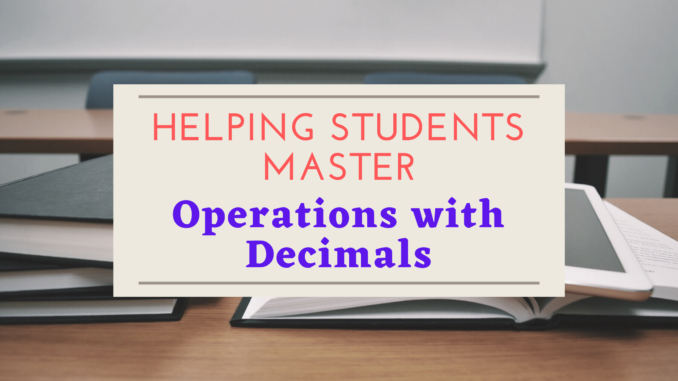
My Students Can’t do the Skill We’re Working on because Some of the Problems Have Numbers wth Decimals in them!
There is nothing quite as frustrating for a teacher as not being able to move forward with a skill because most of your students can’t do any of the questions that have decimals in them.
Your students should already know how to add, subtract, multiply, and divide numbers that have decimals in them, but the majority of the ones seated in front of you can’t!
Do you omit those problems? Push through? Remediate?
Your students can’t master the skill you’re trying to teach them because they can’t get past the decimal! But how do you remediate this essential skill while still working through the grade level standards?
SOME ATTEMPTED SOLUTIONS
1 – Skip ‘em!
Some teachers have their students skip the questions that have decimals in them.
Since they’re trying to teach students the grade-level skill, whether it be an angle theorem, two-step solutions, or something at an even higher grade level, the teacher focusses on the skill and has students only do the problems that contain whole numbers.
The Benefit:
Students can focus on the skill that the teacher is teaching, and obtain mastery on it. Skipping these questions can help students not get flustered by the skill that they can’t perform (decimals), and allow them to learn the grade-level skill.
The Issue:
It is highly likely that your students will see questions involving decimals on the diagnostic or standardized test that they must take.
Furthermore, future skills you (and other math teachers) teach them will contain decimals.
While omitting the decimal questions will help your students focus on the one thing your trying to teach them (the grade level skill), it does prolong the issue of them not being able to work on questions with decimals.
Your students need to know how to perform operations on numbers with decimals
2 – Force it!
Some teachers force the students to do the questions with decimals, without providing sufficient remediation. “Afterall,” they reason, “the student is in an upper grade or subject and decimals were taught years ago. If they haven’t learned it by now, that’s on them!”
The Benefit:
Students will have to work on problems with decimals, so you are exposing them to those questions.
The Issue:
By forcing students to work on the questions that contain decimals, when they don’t know how, guarantees their frustration and failure.
They will get the questions wrong, and not know why nor what mistakes they are making. They will not be able to work on the skill you are trying to teach them, and they will not master it – nor will they improve on operations on numbers with decimals.

3 – Remediate
Many teachers try to take a day out of the calendar (or several) and remediate their students on how to add, subtract, multiply, and divide on numbers with decimals.
The Benefits:
The students do need to master these skills, and trying to master it while learning a new skill will not help them. So remediation is necessary.
The Issue:
Your students have been exposed to problems with decimals for years, and yet they have not mastered it. They will not master it in a day (or a week). They need to master the concept, which requires lots of practice with immediate feedback.
How many decimal problems do you think your students did last year? Let’s guess and say it was 50 – why do you think that you showing them how to do one or two, and then giving them 10 practice problems will result in proficiency? It won’t!
It takes the average person 20-30 repetitions of a skill to master it. And these repetitions need to have immediate feedback or they don’t count.
Your students who are still struggling with decimals have likely had well over 20-30 practice repetitions. What they likely have not had is the immediate feedback. They probably did not have 20-30 practice problems all together, so that they could focus on the skill and master it. And they likely need more than 20-30 practice repetitions, because they’re probably below average at this skill.
By the way, being below average at a skill doesn’t mean your dumb. We are all below average at some skills and above average at others. I’m not a fast learner on musical instruments, but I grasp math concepts relatively quickly. You have students who are artistic or musical or have a host of other skills, but mathematics is not their gift, so we have to work with them; which means extra practice and lots of feedback.
A HYBRID SOLUTION
I choose to do a hybrid of numbers 1 and 3 above.
When teaching the new concept, I pull out the decimal problems and focus on teaching my students the grade level skill. Once they have mastered it, I put the decimal questions back in.
At the same time, I dedicate class time every day to remediating the students on the operation with decimals that they have not mastered.
This remediation is ongoing, scaffolded, without consequences, and with immediate feedback.
Scaffolded Remediation
Not all of my students need to practice adding and subtracting numbers with decimals, some of them have it. So I don’t force them to relearn the material, they get to work on whatever skill they need work on. For some, it might be multiplying numbers with decimals, or dividing them. For some students, they can perform all 4 operations on numbers with decimals and are ready to move on to something more complex.
I have each student work on the skill that they need to remediate, and only that skill until they master it. Once they have mastered it, I progress them to the next skill.
For example, Tanya cannot perform any of the four operations on numbers with decimals. So I began her working on adding and subtracting. Once she mastered that skill, she progressed to multiplying numbers with decimals, and then finally to dividing numbers with decimals. At the same time, Fillip already knew how to add and subtract numbers with decimals. So he did not need to practice that skill and instead began on multiplying numbers with decimals.
Ongoing Remediation
It is not a one-time remediation day. I have my students working on some skill for remediation every day. Since it’s scaffolded, every student is working on the skill that they need to develop. So they are not working on the same skill every day – they work on it until they master it, and then they are progressed to the next skill.

Math Work Without Consequences
One of my biggest frustrations with our current education model is that we penalize failure – though we all say that failure is part of the learning process.
While most teachers recognize this juxtaposition, they struggle to grasp a solution. The reason is that we are doing school the same way it’s always been done. Our classroom procedures are very similar to the ones of our peers, and the ones that were in place when we were in school. For example, most math classes have all the students working on the same skill, at the same time, with the same amount of practice problems and feedback… and with the same results!
The issue we create is that students are not able to wrestle with material, nor experiment with different methodologies, because they’re afraid of mistakes. So we produce students who are good at memorizing terms and formulas, but bad at critical thinking and problem solving.
How do you teach students that it’s okay to make a mistake?
Most teachers say they talk about it, or model it when they themselves make a mistake. But, in practice, students still get penalized when they make a mistake, and they get drug on to the next math concept before they’ve mastered the previous.
Here’s one way I allow mistakes.
I put Sally in the learning station for adding and subtracting numbers with decimals because she still hasn’t mastered it. After the station is completed, and she is assessed, she still has not mastered it. Most teachers then progress her to the next skill – even though the intended outcome was not achieved; mastery of the skill.
Instead, I put her back through the station, and let the new grade when she finishes it the second time replace the previous grade.
By doing so, I am communicating two things: One. This is important. Mastery is expected. You can’t move on until you know this. Two. It’s okay to make a mistake. You didn’t learn it, so we’ll try again, and your grade isn’t going to suffer on account of it taking you longer to learn it. Because in the end, what I want is for you to master this skill.
Work with Immediate Feedback
Immediate feedback is one of the most important things you can provide students when they’re learning something new. It allows them to learn from their mistake. It also prevents them from repeating the mistake over and over again, reinforcing a bad skill – how many times have you seen a student do a worksheet and make the same error on every problem? They needed immediate feedback.
OR – immediate feedback can give students confidence because they know that they are doing the problem correctly and getting the right answer.
So when I am reteaching my students a skill with decimals, I provide them with immediate feedback. Technology makes this easy, you can assign work on websites like KhanAcademy or IXL. But if this is not accessible, I get creative with providing answer keys so that students can check their work as they progress.
When to Provide Remediation
I set aside time in every class for students to work on differentiated remediation.
And some of those foundational skills are working with numbers with decimals!
How Learning Stations fit In
Because I have students working on different skills at the same time, I create learning stations for each skill. These stations are able to operate without direct teacher instruction, so that I am not needed in each one – which allows me to differentiate. Every student can work in a different learning station at the same time, on a different skill, and I am free to move around the room and help them all.
When I am remediating decimals, I have three stations.
1 – Adding and Subtracting Numbers with Decimals
2 – Multiplying Numbers with Decimals
3 – Dividing Numbers with Decimals
And students work through them in that order
I assign students to the station that they need to master (so some begin on station 2 and some on 3).
To discover who needs to work on which station, I give them a diagnostic.
For more information on Learning Stations, click here
Pre—Made Learning Stations on Decimals
Get all 3 for a discount







